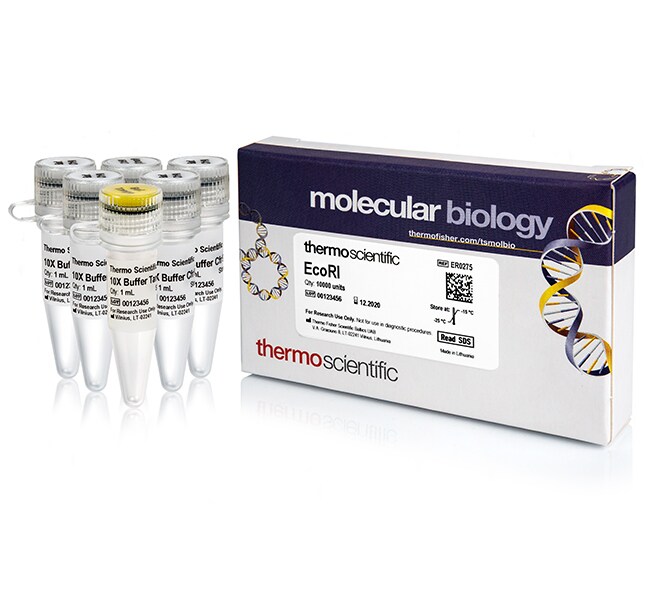Specifications:
| Application | Cloning, Transfection | ||
| Storage Temperature | -20°C | ||
| Product Type | Enzymes | Forms | Liquid |
| Product Brand | Thermo Fisher Scientific™ | ||
| Product Grade | Microbiology grade | ||
Thermo Scientific™ EcoRI is a high-quality restriction enzyme that specifically recognizes and cleaves the palindromic DNA sequence 5'- G↓AATTC -3' / 3'- CTTAA↑G -5'. This enzyme is widely used in molecular cloning, restriction site mapping, genotyping, and Southern blot analysis.
EcoRI efficiently digests DNA at 37°C in its own optimized buffer, ensuring high specificity and consistent performance in restriction digestion experiments. It is also available in a FastDigest™ format for rapid DNA digestion.
Key Features & Benefits
- High-Specificity Restriction Digestion
- Recognizes and cleaves G^AATTC restriction sites with precision.
- Produces sticky ends for efficient ligation and cloning applications.
- Optimized for Molecular Cloning & Genetic Engineering
- Works best at 37°C in its unique EcoRI buffer.
- Part of Thermo Scientific’s Five Buffer System, enabling universal compatibility.
- Efficient DNA Cleavage for Reliable Performance
- High enzyme activity (10 U/μL) for rapid DNA digestion.
- Also available as a FastDigest enzyme for accelerated workflows.
- Compatible with Downstream Applications
- Works seamlessly with DNA ligases, polymerases, and modifying enzymes.
- Produces fragments ideal for recombinant DNA techniques.
- Stable & High-Quality Manufacturing
- Stringently tested to ensure high purity and consistency.
- Free from nonspecific nuclease contamination.
Product Specifications
| Feature | Details |
|---|---|
| Product Name | Thermo Scientific™ EcoRI Restriction Enzyme |
| Recognition Sequence | 5'- G↓AATTC -3' / 3'- CTTAA↑G -5' |
| Catalog Numbers | ER0271 (5,000 units), ER0272 (5 × 5,000 units), ER0275 (10,000 units) |
| Enzyme Concentration | 10 U/μL |
| Optimal Temperature | 37°C |
| Compatible Buffer | Unique 10X EcoRI Buffer, Tango Buffer for Double Digestions |
| Methylation Sensitivity | Sensitive to CpG Methylation, Not Sensitive to Dam or Dcm Methylation |
| Heat Inactivation | Yes (65°C for 20 minutes) |
| Type IIS Restriction Enzyme | No |
| Shipping Conditions | Ice Packs (International), Dry Ice (Bulk Orders) |
| Storage Conditions | -20°C |
| Unit Size | Each |
Use Cases & Applications
1. Molecular Cloning & Recombinant DNA Technology
- Plasmid & Vector Digestion for Gene Cloning
- Produces sticky ends for directional ligation and cloning.
- Ensures efficient DNA fragment excision for subcloning applications.
- Double Digestion for Seamless DNA Assembly
- Works efficiently with other restriction enzymes for multi-fragment cloning.
- Reduces reaction time and enhances accuracy in restriction-based cloning.
2. Genotyping & Genetic Variation Analysis
- Restriction Fragment Length Polymorphism (RFLP) Analysis
- Identifies genetic variants based on restriction enzyme digestion patterns.
- Used for genotyping, marker-assisted selection, and forensic analysis.
- Single Nucleotide Polymorphism (SNP) Detection
- Helps detect point mutations and insertions/deletions in genomic DNA.
- Supports molecular diagnostics and genetic screening applications.
3. Southern Blotting & DNA Fragment Analysis
- Preparation of DNA Fragments for Hybridization Assays
- Ensures specific and reproducible restriction digestion for probe hybridization.
- Used in gene mapping and epigenetic studies.
- Chromosomal Analysis & Methylation Studies
- Suitable for methylation-dependent restriction analysis.
- Helps in differentiating genetic variations and structural modifications.
4. High-Throughput Cloning & Next-Generation Sequencing (NGS)
- Efficient Restriction Digestion for Library Preparation
- Generates consistent DNA fragments for sequencing library construction.
- Ensures uniform fragment size for quality sequencing reads.
- Compatible with Automated Workflows & Liquid Handling Systems
- Ideal for robotic sample processing in high-throughput genomic workflows.
- Eliminates time-consuming buffer exchanges, streamlining DNA digestion workflows.
Recommended Protocol for EcoRI Digestion
Standard 50 µL Reaction Setup:
| Component | Volume |
|---|---|
| Plasmid or Genomic DNA | 0.5–1 µg |
| EcoRI Restriction Enzyme (10 U/μL) | 1 μL |
| 10X EcoRI Buffer | 5 μL |
| Nuclease-Free Water | Adjust to 50 μL |
Incubation & Post-Digestion Processing
- Digest at 37°C for 1 hour for complete restriction.
- Heat inactivate at 65°C for 20 minutes, if necessary.
- Analyze digestion products on a 1–2% agarose gel using ethidium bromide or SYBR Safe staining.
Storage & Handling Instructions
- Storage Conditions:
- Store at -20°C for long-term enzyme stability.
- Avoid freeze-thaw cycles to maintain enzyme activity.
- Handling Precautions:
- Use sterile, nuclease-free reagents and pipette tips to prevent contamination.
- Work in a DNA-free environment to ensure reproducibility.
- Disposal Guidelines:
- Dispose of enzyme and buffers according to biosafety waste regulations.
- Use approved chemical waste disposal protocols for reaction waste.
Why Choose Thermo Scientific™ EcoRI?
✅ High specificity for G^AATTC restriction sites with no star activity
✅ Optimized for molecular cloning, restriction mapping, and genetic engineering
✅ Compatible with the universal Tango buffer for double digestions
✅ Reliable and consistent performance in traditional and high-throughput workflows
✅ CpG methylation-sensitive enzyme for epigenetics and genotyping studies
Thermo Scientific™ EcoRI is a highly precise, fast-acting restriction enzyme, making it a trusted choice for molecular biology, cloning, and DNA analysis applications.
- Pack Size: 10,000 Units 5,000 units 5 x 5,000 units




 0
0
